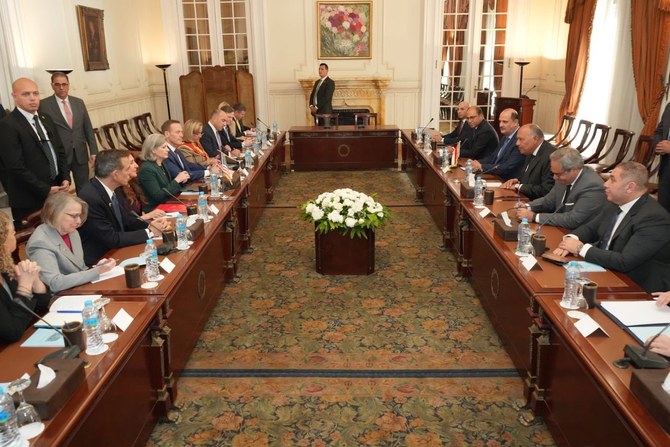CAIRO: Egyptian Foreign Minister Sameh Shoukry met a US delegation on Wednesday to discuss Gaza and escalating regional tensions.
The delegation, headed by Sen. Joni Ernst, is visiting Egypt as part of a regional tour.
Shoukry highlighted the strategic, multifaceted partnership between Egypt and the US, praising the development in relations between the two countries.
He urged the further building of bilateral ties, including political, economic, commercial and military relations.
The turbulent situation in the Middle East and around the world requires intensifying coordination mechanisms and joint action to establish peace, security and stability, Shoukry said.
Ahmed Abu Zaid, spokesman for the Ministry of Foreign Affairs, said that the meeting with the US delegation dealt with a number of regional issues, most notably the situation in the Gaza Strip.
Shoukry called for the enclave to receive necessary humanitarian aid through the implementation of UN Security Council Resolution No. 2720, which would enable urgent deliveries to Gaza.
The foreign minister relayed Egypt’s “complete rejection” of any attempt to displace Palestinians or end their cause for statehood, which would further threaten regional stability.
He condemned the targeting of civilians and Israeli settler violence, highlighting the need to reach an immediate and comprehensive ceasefire.
Abu Zaid said that Shoukry warned the US delegation of the risk of the Gaza conflict spilling over into the wider region, highlighting skirmishes on the Lebanese border and in Syria and Iraq.
Shoukry added that freedom of navigation in the Red Sea is necessary for the flow and security of global trade movement.
The US delegation inquired about Egypt’s vision for the future of the Palestinian issue, the Foreign Ministry said, adding that Shoukry recommended solutions to defuse regional tensions and reach a comprehensive settlement.
The delegation highlighted the importance of US-Egypt relations and the strategic partnership between the two countries, signaling Washington’s desire to consult with Egypt regarding international and regional issues.
Egypt was praised by the US delegation for facilitating the entry of humanitarian aid into the Gaza Strip as well as encouraging prisoner release deals.


























